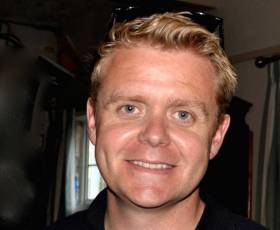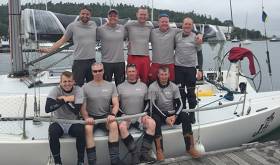Displaying items by tag: Barry Byrne
Barry Byrne is July’s 'Sailor of the Month'
July 2018 will go down in Irish sailing history as one of the busiest months ever experienced, including as it did the Volvo Round Ireland Race and Volvo Cork Week.
In this exceptionally busy period, Commandant Barry Byrne of the Defence Forces was arguably the most active sailor on our seas, as he skippered the Irish Defence Forces on the J/109 Joker 2 to second overall and victory in the Corinthian Division of the Round Ireland Race, and in Cork Week he not only played a key role in organizing the highlight event, the Beaufort Cup series for services crews, but he successfully defended it, again skippering Joker 2.
Commandant Barry Byrne & The Defence Forces Win The 'Sailor Of The Month' Special Award For July
It was a real light-bulb moment when the initial notion of the brilliant idea which became the Beaufort Cup first surfaced. The concept of a series-within-a-series, a special programme for offshore racers crewed at least 50% by members of the Defence Forces within the overall umbrella of Volvo Cork Week, had a lot going for it from Day One.
As it developed, it became better and better, with the net spreading wider to include the lifeboats and the coastguards and other emergency services with a maritime angle. Thus the success of the event – which started with a 140-miles offshore race from the Naval Base in Cork Harbour round the Fastnet Rock, and ashore included the highlight of a black-tie dinner in the Officer’s Mess on Haulbowline – seems so obvious in hindsight. Yet it was such a novel idea when initially launched with just six months to go that the organisers thought they’d do well to muster three or four boats.
But it captured the imagination of the sailing community such that 12 competitive boats became available. And once it was under way, it captured public imagination too – there was something specially attractive about men of war and people who usually deal with maritime emergencies going to sea for sport and fun.
As this unusual sailing competition unfolded within the ambit of Volvo Cork Week, we found it attracted special attention. It merits a Special Award. And as we have to put one name to the Afloat.ie Special Award for July 2016, it goes to Commandant Barry Byrne who skippered the J/109 Joker 2, first winner of the Beaufort Cup, crewed almost entirely by members of the Defence Forces. But in truth the Special Award goes to everyone who was involved in adding this visionary event to the Irish sailing calendar.






























































